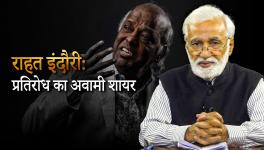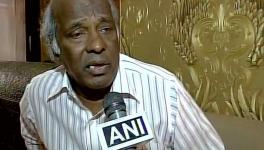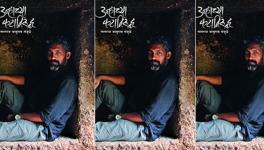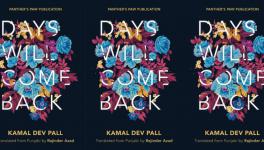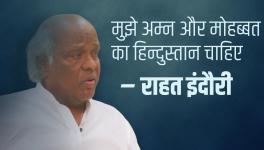“Kisī kē bāp kā Hindōstān thōdi hai”: Rāhat Indōrī
Image courtesy: OUP
Using poetry as an archive, Ali Khan Mahmudabad's Poetry of Belonging: Muslim Imaginings of India 1850–1950 traces the history of the musha’irah, the site of poetic performance, as a way of understanding public spaces through the changing economic, social, political, and technological contexts of the time. It seeks to locate the changing ideas of watan (homeland) and hubb-e watanī (patriotism) in order to offer new perspectives on how Muslim intellectuals, poets, political leaders, and journalists conceived of and expressed their relationship to India and to the transnational Muslim community.
The jharokhas (overhanging enclosed balconies) of the Red Fort in Delhi were flooded with light while the rest of the fort formed a silhouette that melted into the darkness of the night.
The stage was set and the year was 2015. Banners welcomed people to a ‘National Heritage’ mushā’irah (poetic symposium) organized by the Urdu Academy under the auspices of the Delhi government. Some of the posters were in the nastaliq script, whereas others were in naskh.1 Perhaps the use of the Arabic script, naskh, was yet another indication of the gradual replacement of the historical memory of Persian by Arabic? Or maybe it was simply a lazy technician’s compromise with a computer that came with naskh pre-loaded but not nastaliq. The poets sat on a dais in a semi-circle, facing an expectant audience. The audience, dressed in winter clothes, was from a cross-section of society and was listening to most of the poetry with enthusiastic clapping. It was then Rāhat Indōrī’s turn to take the stage. He recited a number of his well-known poems but towards the end, almost sensing what people wanted, he began to recite a poem which he has been requested to recite at various mushā’irahs,from the quaint qasbahs (settlements) of Awadh to the stark and sparse halls of various venues in Houston and Riyadh.
Indōrī then jokingly said that someone had said that this particular poem, which he was about to recite, was now old. The audience knew which one he was speaking about and someone shouted irshād (please recite). He began:
Agar khilāf haiñ hoñē dō jān thōdī hai
If they’re against you so be it, it’s not a question of life
As soon as he recited this first line, a man from the audience stood up and started vigorously proclaiming zindah-bād zindah-bād (may you live long). Indōrī slowly wove his way through various couplets, pausing to repeat a phrase here, emphasizing a line there. The nāzim (master of ceremonies [MC]) would thoughtfully repeat a word. Many of the couplets not only spoke to the insecurities that minorities, Dalits and specifically Muslims, feel but also encouraged a form of literary defiance, for language and particularly literature is often the last, although by no means the weakest, weapon of resistance for those who are otherwise disenfranchised.
For instance, Indōrī said, ‘Let the fire rage if they want it to, many [other] people’s houses will also fall prey to it.’ The verse, a clear allusion to riots and communal violence, could of course be taken as both threat and remorse. He continued. People swayed as they repeated his lines. Others looked at those around them and with an air of self-satisfaction, as if they were privy to the workings of the poet’s mind, finished reciting the couplet before the poet could. Indōrī taunted those in power, a jibe at the Bharatiya Janata Party (BJP), and said that they, the sāhibē masnad (occupiers of the throne, those in power), should not forget that they may be in power today but tomorrow they may very well be out of power, for this government is no one’s zātī makān (personal house). Members of the audience screamed insha’Allah (God willing), buoyed, temporarily at least, by the hope that the verse offered. Each couplet had been building up towards a crescendo. The time came for the last verse. The atmosphere was electric. Most of the audience already knew the couplet by heart. The poets on the stage were also familiar with the couplet.
And Indōrī began:
Sab hī kā khūn hai shāmil yahāñ kī mittī mēñ
Everyone’s blood is a part of this earth
He paused before reciting the second line and said that the nāzim and Anwar Jalālpurī (d. 2018), a fellow poet, had earlier said that the theme of this mushā’irah should be one of muhabbat (love). Indōrī countered and said that the theme of all mushā’irahs should be love. The tone and manner in which he said this half suggested that he meant what he was saying but also partly indicated that he was saying,‘Talk of love is all very well, but a time comes when you must speak truth to power.’ Indōrī repeated the first line again,‘ Sab hī kā khūn …’, paused again and said, ‘Everyone! Hindu, Muslim, Sikh, Christian, and whoever lives in this country.’ He then went back to the previous couplet and reminded the audience of the target of the verse: kirā’ēdār haiñ zātī makān thōdī hai (they’re here on lease, they’re not the owners). The audience was now palpably anxious to hear the couplet and Indōrī did not disappoint in his delivery.
Sab hī kā khūn hai shāmil yahāñ ki mittī mēñ
Kisī kē bāp kā Hindōstān thōdi hai
Everyone’s blood is a part of this earth
India is not anyone’s personal property
The audience erupted into applause. People clapped, young boys whistled, and older men got up and raised their hands to repeatedly say wāh wāh. Indōrī recited the phrase Kisī kē bāp kā (literally, it is not of anyone’s father) both defiantly and angrily, in many ways echoing the sentiments of the audience. It was not without irony that this couplet was being met with such applause at the very Red Fort where Prime Minister Modi had delivered his Independence Day address. Of course, it was also equally important that Indōrī defiantly recited this couplet standing at the pre-eminent symbol of Mughal rule in India, a period of history the facts of which are still fiercely contested today and one which plays a role in the everyday politics of north India in particular. Bābur kī aulād (progeny of Babur) is often used as a taunt against Muslims and the question of Muslim loyalty to India remains at the forefront of political discourse. Perhaps this is why Indōrī’s final couplet became so popular. Indeed, it took on a life of its own and Indōrī continues to recite it in various mushā’irah s and talk shows.2 It is also often used as a verbal form of gun-slinging in twitter duels by various prominent lawyers,3 journalists,4 politicians,5 and of course ordinary citizens. Although literary critics and others might dismiss the poem as lacking profound meaning and depth, the fact remains that Indōrī’s poem speaks to his audience through multiple registers while invoking the past, answering to the present, and offering glim-mers of hope for the future.
Today, during a time of severe political polarization in India, Urdu literature and poetry and their attendant ‘spaces’ continue to find a broad audience. Indeed, Urdu poetry remains a medium that is deployed as a trenchant critique of the vagaries of political discourse and the communal polarization that is taking place in India. The formal and informal spaces of poetry remain crucial arenas for not only understanding the anxieties of the past and the contradictions of the present but also for discovering the possibilities of the future.
1. The nastalīq script uses a modified form of Perso-Arabian lettering and is written on a diagonally descending line, while naskh is written on a horizontal line.Nastalīq has elongated and rounded letters, whereas naskh letters have more angularity.Nastalīq has historically been the prevalent script used in South Asia, but with the advent of computers that lack the font,naskh is also widely used.
2. See The Kapil Sharma Talk Show. See https://www.youtube.com/ watch?v=K-4KfG2m3bc, last accessed on 20 October 2019.
3. See lawyer Sanjay Hegde’s tweet, available at https://twitter.com/ sanjayuvacha/status/939736330157768706, last accessed on 10 November 2018. 4. See NDTV news anchor Ravish Kumar’s tweet, available at https://twitter. com/SirRavish_/status/897274105673601026, last accessed on 10 November 2018. 5. See Chief Minister of Delhi Arvind Kejriwal’s tweet, available at https://twitter.com/arvindkejriwal/status/794770567459061761?lang=en, last accessed on 10 November 2018.
Ali Khan Mahmudabad is an academic, columnist, and public speaker. He has a specialisation in a wide range of subjects involving political, religious, and security-related issues in South Asia as well as the greater part of West Asia (the Middle East). He is currently assistant professor of history and political science at Ashoka University, Sonipat. He writes a fortnightly column for the Urdu daily The Inquilab, apart from also regularly contributing to English and Hindi print and online publications.
This is an excerpt from Poetry of Belonging: Muslim Imaginings of India 1850–1950 written by Ali Khan Mahmudabad and published by Oxford University Press. Republished here with permission from the publisher.
Get the latest reports & analysis with people's perspective on Protests, movements & deep analytical videos, discussions of the current affairs in your Telegram app. Subscribe to NewsClick's Telegram channel & get Real-Time updates on stories, as they get published on our website.











